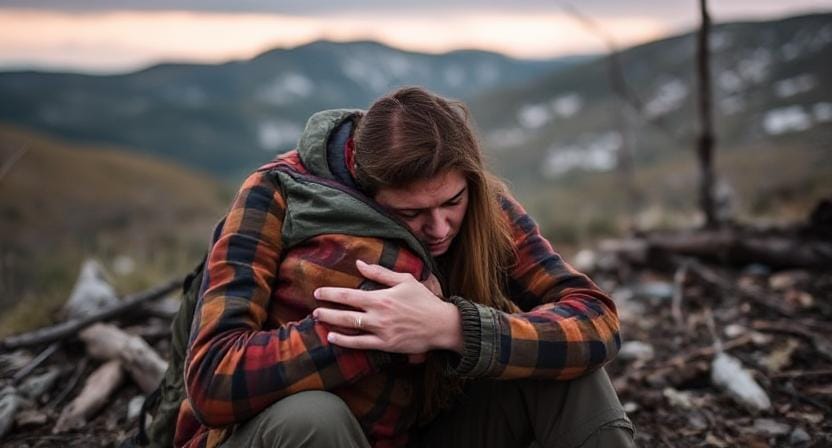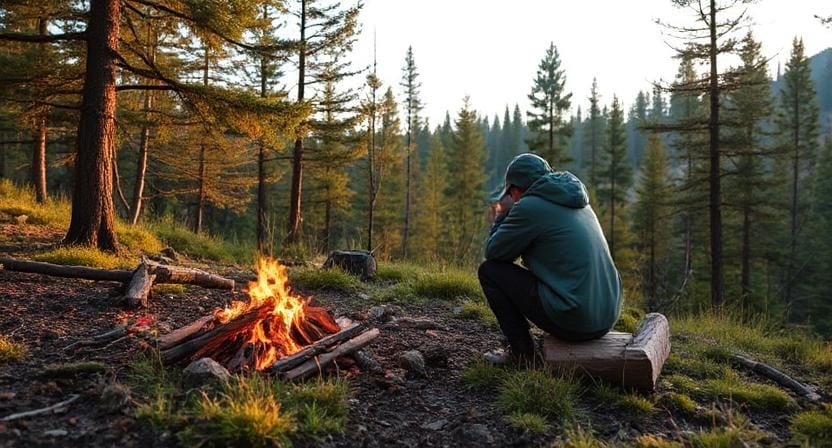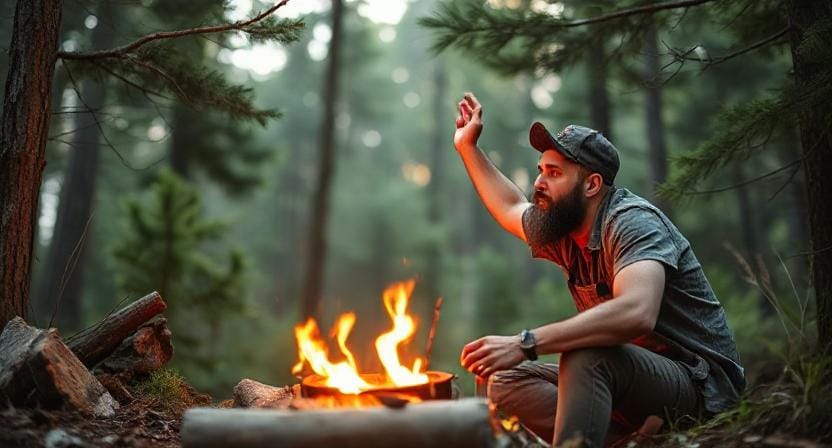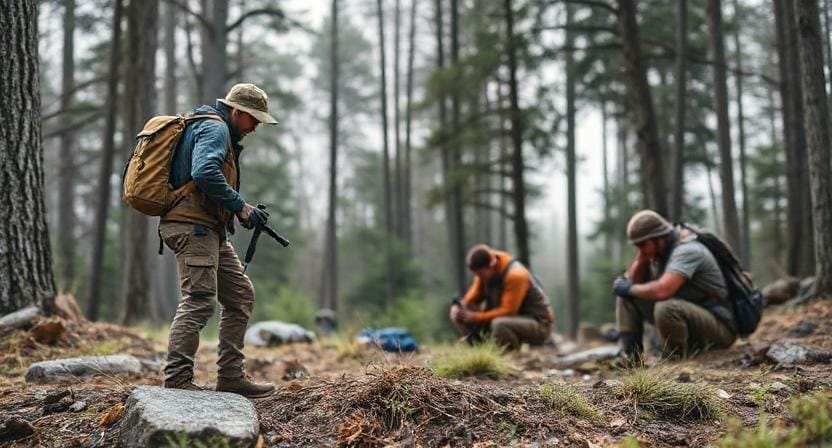Last Updated on November 2, 2025 by Kevin Collier

Top Takeaways and Key Concepts
- Practice seeing silver linings in challenges to strengthen mental resilience daily.
- Embrace discomfort in small doses to build confidence and adaptability.
- Break big goals into smaller, achievable steps to reduce overwhelm.
- Use positive self-talk to maintain motivation and manage stress effectively.
- Build a supportive network to share experiences and reinforce mental toughness.
Picture this: you're outside and it's nice. The trees are swaying in the breeze and the birds are chirping. Then, hold on. What is that noise? Is it a deer? A squirrel? Or maybe a bear that has eaten too much honey and is wondering if you look like dessert?
At times like those, you need to be mentally tough. It's not really about running or muscles. It's about being able to manage crazy surprises, like when your camping stove suddenly turns into a fine rock.
Please Note: This post may contain affiliate links. If you click one of them, we may receive a commission at no extra cost to you. As an Amazon Associate, I earn from qualifying purchases.
You know how life can be a little unpredictable? It could be that your camping gear is acting up or that rainstorm that came out of nowhere ruined your plans. It's important to build mental strength. It's like working out a muscle, but in your head.
Let’s talk about some fun ways to boost that brain power.
Start small. When something happens, find a silver lining. Like that camping stove? Maybe it’s time to practice making a cold sandwich. Can't find your way? Each wrong turn can lead you to a new adventure (or an awesome picnic spot).
Take breaks when things get tense. Close your eyes, take a deep breath. Picture your happy place. For me, it's sitting in my favorite chair with a cup of coffee, watching the world go by. It sounds silly, but it works!
Try to laugh—even at silly mistakes. If you drop your marshmallows in the dirt, just pretend you’re making a gourmet dish. Who knows? Maybe that adds a little crunch!
Stay curious. Nature is full of surprises. Use each one as a moment to learn. Is that sound a bear or just a squirrel? Either way, you’re getting to know the wild a little better.
When things get tough, remind yourself you can handle it. Just like that bear might find a snack, you’ve got the skills to find a way through any situation. With a smile, a little humor, and some mental toughness, you’ll be ready for whatever comes your way. Cheers to adventure!
*** Shop for Survival Gear - Tools - Kits ***
Survival Gear - Bags and Backpacks - Knives - Boots/Footwear - Communication
Outdoor Cooking - Gloves - Hydration - Dry Boxes - Water Filtration Systems
Tents - Sleeping Bags - First Aid Kits - Multi-Tools - Flashlights - Fire Starters
Navigation - Survival Food - Night Vision - Headlamps - Stun Guns - Binoculars
Embrace Discomfort Like an Old Friend

Let's be honest: discomfort is as certain as stepping in gum while wearing your beloved shoes. Every day, we have to deal with uncomfortable situations, such when it's cold when camping or when you're seated next to someone on public transportation who appears too excited about their lunch choices.
The secret to become mentally robust is to accept these times instead of running away from them.
I remember my first solo hike when it rained so hard that I felt I had wandered into a scene from “The Notebook.” I opted to enjoy the wet sensation instead of complaining (well, maybe just a bit).
I discovered how strong I could be by recognizing that discomfort is a part of life and not anything to be afraid of, even when my socks were squelching like two angry ducks.
Make Goals That You Can Reach

Goals help us stay on track, as when you're attempting to make your way across IKEA without getting lost for three hours (it's almost an Olympic sport). But make sure these goals are realistic! To set yourself up for success, you need to split big ambitions into smaller ones.
For instance, if you're getting ready for an outdoor adventure but are feeling overwhelmed by the details (just picking out food can make anyone go crazy!), break it down: On the first day, you could pack your gear. On the second day, you could plan your meals. And on the third day, you could practice setting up camp in your backyard (but don't scare the neighbors).
This step-by-step method makes you feel more confident and reminds you that you can handle problems one at a time.
Talk to Yourself In A Positive Way

I've learned a lot about self-talk from going on a lot of walks and some bad camping experiences. It's more important than you might believe. When things go wrong, like when you realize you forgot your favorite food, you have two choices: give up and feel sorry for yourself or be your own cheerleader.
Instead of stating, “I'm going to fail,” try saying things like, “I've got this!” or “This will make a great story later!” Believe me, talking positively to yourself works! When things get tough, whether you're outside or not, remember that you are strong and capable enough to manage whatever that comes your way.
Make Your Support Network Stronger

Nobody can live alone; even superheroes need help sometimes! Building a support network is important for getting mentally strong because let's be honest: we all need someone to tell us that we're not going crazy sometimes.
When I was feeling anxious before my first large backpacking trip (really questioning every choice I made in life), my pals came together like they were getting ready to fight off negativity!
They told me about their own experiences, cheered me on, and made me laugh so hard that Pepsi spilled out of my nose. Being among people who care about you helps you be strong and reminds you that being vulnerable is not a sign of weakness; it's a sign of being human.
Learn From Your Mistakes
Here's a truth bomb: things go wrong, and they typically do at the worst times! But instead of allowing setbacks stop us in our tracks (like the bear experience), use those times to learn.
I remember one time when I tried to cook dinner over an open fire, something I clearly didn't know how to do. I ended up making what looked like burnt sacrifices that were only good for sending smoke signals saying “Help!”
Instead of being sad about the charred beans (which should be against the law), I thought about what went wrong: too much heat? Do you not have enough patience? I learned from those mistakes and got better at cooking, and I also made a promise to myself not to make the same mistakes too often.
Conclusion: Cultivating Resilience One Step at a Time
It's like learning to ride a bike to build mental strength. You can't just get on and ride like an expert. You have to practice and fall a few times, maybe even scrape your knees. But every time you wobble, you get stronger. Life is the same way!
It might be hard to deal with problems, right? When things get tough, like when it's cold at night in a tent or when you have to trek up a steep hill, remember that it's all part of the trip. You are getting bigger every time. It can also assist to set tiny goals. Want to hike a longer path? Begin with a small one and work your way up. Every step matters!
It makes a significant difference to talk to oneself kindly. Instead of stating, “I can't do this,” say, “I'm working on it.” Very easy, but it might transform how you feel. It's like rooting for oneself when no one else is there.
It's important to have friends who are there for you. Tell them what's bothering you. They might have been through the similar situations and can help. It's like having a group of people cheer you on during a hard game. You are not the only one!
It's also very crucial to learn from your mistakes. Have you ever dropped a marshmallow in the fire? Oh no! Don't be mad; think of it as a story to tell later that will make you chuckle. Every “oops” is a chance to learn something new.
When things go wrong, like when the Wi-Fi goes out during movie night, remember that it's just a bump in the road. Breathe in deeply. Just like when you see a bear, be cool and find a way out. You can grow mental toughness like you can build a muscle. It's there, simply waiting for you to do something about it.
Take on the small problems and let them make you stronger. You can do this! You're getting closer to the mental strength we all need every time you try. And hey, there are all kinds of surprises that come with adventure. Think of all the stories you'll be able to tell!
Frequently Asked Questions
What is mental toughness in survival situations?
Mental toughness is the ability to stay calm, think clearly, and stay adaptable under pressure or uncertainty.
How do small challenges help build mental resilience?
Small discomforts train your mind to handle bigger stress later, improving confidence and coping capacity.
Why is breaking big goals into smaller tasks useful?
Small steps reduce overwhelm, provide quick wins, and help maintain progress even during hardship.
How does positive self-talk affect stress?
Positive self-talk shifts mindset toward confidence and reduces the negative emotional impact of setbacks.
Why is a support network important for mental toughness?
A support system provides encouragement, perspective, and comfort when facing difficult situations.
Can looking for silver linings really improve resilience?
Yes, reframing experiences helps your brain recognize opportunity and growth instead of only difficulty.
Is mental toughness something that can be learned?
Yes, through consistent practice, reflection, and intentional mindset shifts, mental toughness can be developed over time.
Suggested Resources:
Mental Toughness Training for Sports
https://www.psychologytoday.com/us/blog/the-power-prime/201504/mental-toughness-training-sports
10 Ways to Build Mental Toughness
https://www.forbes.com/sites/jamesclear/2020/01/08/10-ways-to-build-mental-toughness/?sh=5c4e5f1d2b8d
How To Build Mental Resilience
https://www.healthline.com/health/how-to-build-resilience

Kevin Collier is a seasoned survivalist and expert in prepping and homesteading, contributing to WiseSurvive.com. With a deep-rooted passion for self-sufficiency and outdoor survival skills, Kevin shares practical advice, strategies, and resources to help individuals prepare for any challenge. His informative articles cover a range of topics, from essential survival techniques to sustainable living practices, empowering readers to thrive in any situation. Whether you're a novice or a seasoned prepper, Kevin's insights will inspire you to take charge of your readiness and build resilience for the future.




